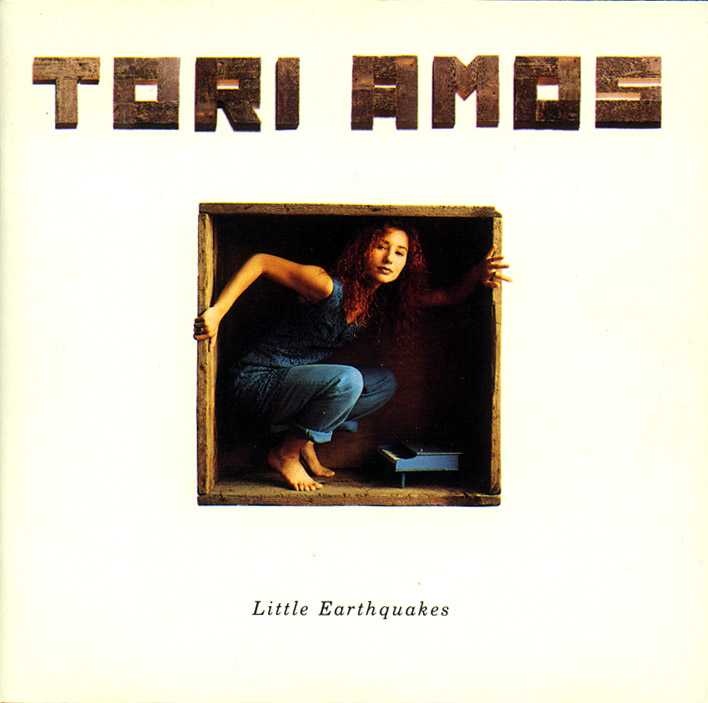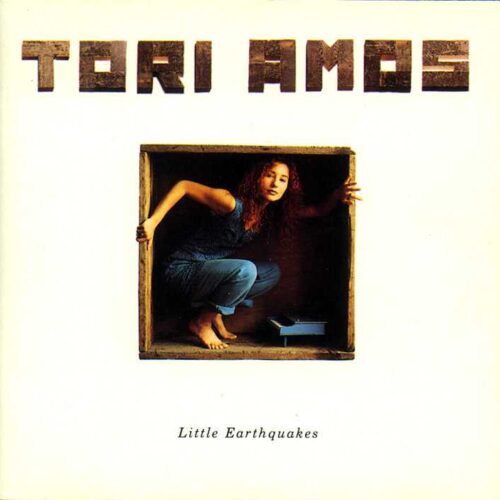Like so much memorable work, Little Earthquakes came from adversity, the feeling of having something to prove, and a return to neglected roots. Before its release in early 1992, Tori Amos had spent several years in Los Angeles on the periphery of the showbiz circuit. After a failed stint fronting a synth pop group, her record label, Atlantic, gave her a last chance to succeed, as a solo artist.
A minister’s daughter who played piano from the age of two and was the youngest person ever to be admitted to the Peabody Conservatoire, she began composing low-budget, piano-led songs with lyrics that reflected her own personality. Initially she found herself crushed again; the first master tapes were rejected with the comment that there wasn’t a hit among them.
She and producing partner, her then-boyfriend Eric Rosse, regrouped and went back to his home studio to record more songs. Eventually, Atlantic sent her to their partner label in England where they felt her introspective piano would find more favor. The final phase of the album was recorded in London, where Tori played small clubs and support sets.
She soon attracted attention due to the rawness of her lyrics. Musical soul-baring was something the UK hadn’t seen for a while. A music press which had been preoccupied with acid house and techno were suddenly faced with intimate, outspoken offerings about religious guilt, the parent-child relationship, sexuality and lost love. Awestruck music journalist David Stubbs commented after an early gig: “I feel as though I’ve just cheated on my wife…”
The a cappella ‘Me And A Gun’, written in response to the film Thelma and Louise, dealt with Tori’s sexual assault at knifepoint some years earlier. Sung softly like a nursery rhyme it ends with the haunting refrain, "I haven’t seen Barbados so I must get out of this". Inevitably, many were drawn to her candor, feeling she was articulating versions of their pain. Others were unsettled and unsure how to process her. But there’s another side to ‘Little Earthquakes’ and to Tori, too. The album’s heavy themes are balanced by the playful music-hall quality of ‘The Happy Phantom’ and ‘Leather.’
Little Earthquakes bears many of what would become Tori’s musical and lyrical signatures. Her compositions are classically-influenced; led by voice rather than genre. Her attention to detail is fastidious, and the thought processes leading to her songs are intricate, if not always clear. Her work has often been inspired by marginalized women from history or fiction (the video for early single ‘Crucify’ depicts her dressed as Anne Boleyn). She uses these archetypes to explore broad themes and concepts rather than tell individual stories, making the lyrics metaphorical and open to interpretation. Her early rejection of great songs that didn’t fit with the overall ‘flow’ of the album led to a catalogue of impressive – often collectable – B-sides which tend to be played live, most notably the defiant ‘Take To The Sky’, which sums up the album’s back-from-the-brink mood.
Over twenty years and 12 albums later Tori has risen above the early inevitable comparisons to every female artist but her debut remains something inimitable. Though she has never been explicitly political, she embodies a sense of justice. As she comments in typical allegorical fashion, in the memoir Piece By Piece (written by Ann Powers): “There are times when I have had to make peace with the fact I am at war. And sometimes you have to fight those who do not want love to conquer all.” Her more recent work has also been very effective at capturing the mood of its time.
2001‘s Strange Little Girls, a covers album of songs about women by men, was released in a climate of renewed debate about misogyny in music. Her cover of Eminem’s ‘Bonnie and Clyde’ overlays his cartoon-violent lyrics with wailing synths and dramatic bass, a reminder of their inherent sinisterness. 2002‘s Scarlet’s Walk, inspired by the theme of an American road-trip, was an apt backdrop to post-9/11 debates about national identity. Last year’s Night of Hunters influenced by the works of famous classical composers, is a cycle of songs about a (fictional) marriage breakdown.
Tori’s great strength is the capacity to re-invent and yet consistently return to themes that have always interested her: mythology, spirituality, and the role of women. After years of on-off experiments with electronic music, Night of Hunters is her most fully realised album since Little Earthquakes. Though its production is more lavish, its lyrics more subdued, her intensity hasn’t changed in two decades. The woman once said to have observed “I’m an acquired taste. I’m anchovies. If I was potato chips I could go more places,” is still going places.



